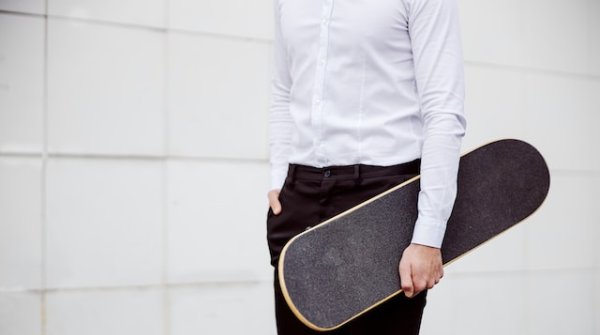58 - that's how many games had to be cancelled between 2018 and 2022 in the J. League, Japan's top soccer league. Four times more than in the previous four years. The reasons were not riots or terrorist attacks, however, but typhoons, floods and snowstorms, i.e. direct influences of the climate crisis that is hitting Japan hard. This has been an eye-opener for those in charge: The J. League has recently significantly increased the number of climate- and environment-related projects - from 133 in 2016 to 873 in 2022. The measures include initiatives to recycle, reduce waste or save CO₂ emissions. In some cases, they include quite creative solutions. For example, fans of FC Osaka were able to exchange containers of used cooking oil for free tickets to a game. Club sponsor Ueda Yushi then used the oil to make soap products. "This way we can involve people, and the sport becomes a role model for society," Seita Kotani, head of marketing at FC Osaka, told the Japan Times.
As with marathons, everything in climate protection begins with the first step. The organizers of one of the oldest running events in the world, the Boston Marathon, are following this motto: compostable cups are available on the course, and water stations make plastic bottles superfluous. This has reduced the amount of residual waste by almost 40 tons since 2018. In the meantime, 80 percent of the waste generated is recycled or composted. Last but not least, participants and the public are encouraged to use public transport or carpool.

When people think of a change in transportation, they often think of Paris. The 2024 Olympic Games are an important motivation for the bicycle-friendly transformation of the city: Numerous new bicycle paths and parking spaces are being built - not only at the sports venues. Spectators will be able to use public transport free of charge, and athletes will be transported in a climate-friendly fleet of vehicles. Sustainability was a key asset in the decision to award the Games to Paris. The biggest eco-plus: 95 percent of the competitions will take place in existing or temporary venues - and building less new infrastructure means less CO₂ pollution.
Paris was certainly looking closely at the 2022 European Championships multisport event, which drew 1.47 million visitors* to Munich. "The majority of the sporting competitions were held in existing sports facilities. Only where it was unavoidable were temporary structures built," says Marion Schöne, managing director of Olympiapark München, in the recently published Sustainability Report. In addition, 5,000 kilograms of banners and flag materials were reused and more than 500,000 PET bottles were saved by installing water dispensers and issuing reusable drinking bottles. This commitment was recently recognized with an award at the SPOBIS Conference 2023. "We are certain that by hosting the European Championships Munich 2022 we have made a contribution to a more sustainable future for major sporting events," says Managing Director Schöne.
Catering and merchandising, construction and resources, traffic and noise, nature and landscape, water, waste, sustainability management, energy and climate protection, and dialog and participation - the German Olympic Sports Confederation (DOSB) focuses on these nine aspects when it comes to event sustainability. "These topics cover everything we can address in the context of the sustainable development of sporting events," says Prof. Dr. Peter Kuhn from the Bayreuth Center for Sport Science and co-founder of the think tank sportainable.
An overview of best practices and possible measures in sustainability management is provided by the DOSB portal "Green Champions 2.0". On the platform of the DOSB, the German Sport University Cologne and the Öko-Institut, organizers of large or small events can enter various characteristics such as time period, activity space, location, size or level - and a list of concrete measures is already available. With regard to catering and merchandising, the DOSB recommends, for example, "checking the use of organically produced food and drinks" or "doing without or reducing to a minimum flyers, giveaways and similar items."
The portal is to be further developed by the end of 2024, says Bianca Quardokus, the DOSB's Sports Facilities, Environment and Sustainability Officer: "The website is intended to help anchor the topic of sustainability in smaller competitions or club festivals as well. The information and recommendations for action are intended to help the topic of sustainability reach the broader sports community."
Those who are committed to organizing their event in an environmentally conscious way can raise awareness among the public through appropriate communication - says DOSB consultant Quardokus: "Sustainable sporting events can be a multiplier for communicating sustainability issues such as climate-friendly mobility, waste management and diversity to spectators and participants. If I use my event ticket to travel to the stadium by public transport, I may do the same on other occasions in the future." In first place for CO₂ emissions is mobility - especially that of spectators.
Finally, a look at a somewhat smaller event that is already doing a lot right: the Allgäu Triathlon. Since 2022, the cult triathlon has been treading more sustainable paths with the #BeKULT initiative. "#BeKULT is not an ad hoc story for us, but a long-term process with ambitious goals," explains Managing Director Christoph Fürleger. The measures include, for example, that event jerseys are only available by advance order or that change bags are no longer issued. The catering is regional, seasonal and mainly vegan. And reusable cups are used at the catering points. This means that the Allgäu is even a step ahead of the Boston Marathon in terms of sustainability. But the main thing is that things are moving forward!

 SustainabilityReady for the Green Deal? An Update for the Sports Industry
SustainabilityReady for the Green Deal? An Update for the Sports Industry
- Awards
- Mountain sports
- Bike
- Fitness
- Health
- ISPO Munich
- Running
- Brands
- Sustainability
- Olympia
- OutDoor
- Promotion
- Sports Business
- Textrends
- Triathlon
- Water sports
- Winter sports
- eSports
- SportsTech
- OutDoor by ISPO
- Heroes
- Transformation
- Sport Fashion
- Urban Culture
- Challenges of a CEO
- Trade fairs
- Sports
- Find the Balance
- Product reviews
- Newsletter Exclusive Area
- Magazine







